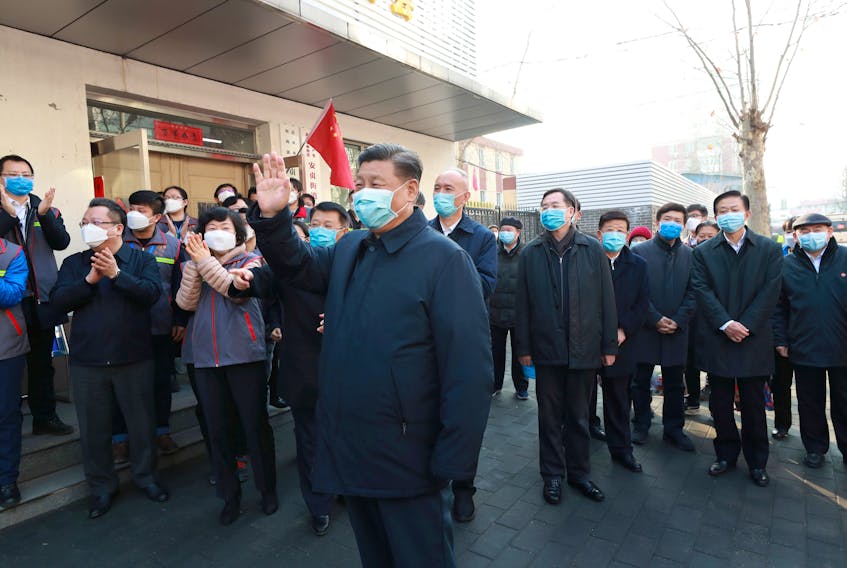China officially went back to work on Monday, after an extended two-week Lunar New Year holiday, while the authorities struggled to get the spread of the new coronavirus under control. But a lot of Chinese are not going back to work yet, and the spread of the “devil virus” (as President Xi Jingping called it) is manifestly not under control.

This virus has already killed more than 800 people – more fatalities in two months than the SARS (severe acute respiratory syndrome) outbreak of 2002-03 caused in seven months– and it’s accelerating. The last few days have seen more than 80 deaths a day, and the death rate in the city of Wuhan in Hubei province, the point of origin of the disease and still its epicentre, is now four per cent of those infected.
The death rate is still only two per cent nationally, but infections elsewhere are generally more recent than those in Hubei province and may not reflect the final death rate. And it’s still spreading fast within China: four large cities in Zhejiang province on the coast are now also locked down.
Significantly, Xi is no longer claiming that he is “personally commanding” the anti-virus fight. If this is going to be a complete disaster, somebody else should take the blame, and the man in charge of the national campaign against the virus is now vice-premier Sun Chunlun.
Well-aware that he is now the designated fall guy, Sun immediately visited Wuhan and declared that the city and country now face “wartime conditions.”
Waxing full-on hysterical, he warned: “There must be no deserters, or they will be nailed to the pillar of historical shame forever.”
But mere rhetoric won’t save him if the epidemic goes nationwide.
It probably will: the two or three weeks that were wasted after the virus was first detected cannot be recovered. But the enforced holidays, travel curbs and lockdowns, belated though they are, may still limit the spread of the virus beyond China.
Or maybe not, but even if the virus is largely contained within China the risk of financial infection is high. High enough, in fact, to qualify as a potential black swan.
A black swan is an unforeseen event that has a huge impact on the normal course of events.
The SARS epidemic in 2002-03 was a black swan: it knocked about two percentage points off China’s economic growth that year.
However, that epidemic did not cause a global recession, because back in those days China was only a small part of the global economy.
Now the Chinese economy is the world’s second-biggest. It takes up four times the space in the global economy that it occupied in 2002, so a two per cent fall in Chinese economic growth translates into at least a half-percent hit to the entire global economy. Which would not be a big deal if the global economy was in good shape, but it isn’t.
Indeed, 12 years after the 2008 sub-prime financial crisis the global economy is still in the intensive care ward. There has been no return to the pre-crisis high growth rates, and interest rates, except in the United States, are still at rock-bottom. That means the banks have no room to cut the cost of borrowing and stimulate demand if the economy is starting to tank.
This applies in particular to China itself, where the banks have been forced by the government to finance huge amounts of unproductive investment as the regime continuously primed the pump in order to ward off a recession.
It worked, in the sense that the loans financed a further orgy of construction that has now equipped the country with 100,000 kilometres of under-used expressways and four half-empty 60-storey apartment towers at all four corners of every major intersection in each of the country’s hundred biggest cities. China was the only major country to avoid a recession after 2008 – but it left the banks staggering under a mountain of bad debts.
By now China has a Potemkin economy where the official economic growth rate is six per cent a year but the true number, as measured by electricity use or megatons of freight carried by the railways, is between two per cent and three per cent. Knock two percentage points off that and you have no growth at all – and a crisis of survival for the regime.
That would be the biggest black swan you ever saw, but remember that the lies and official incompetence that surrounded the Chernobyl disaster played a big part in making the Soviet public ripe for regime change a few years later.
Could the coronavirus have a similar effect? It’s not likely, but it is conceivable.
The immediate and short-term deaths from the Chernobyl melt-down amounted to sixty people. The Wuhan coronavirus has killed a dozen times as many Chinese citizens already.
Gwynne Dyer’s new book is “Growing Pains: The Future of Democracy (and Work).”








